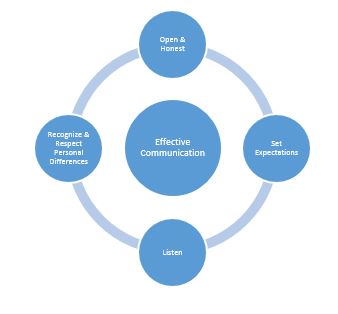
By Generation Next Treasurer Jennifer Pellersels
Altec Industries
This article was
originally published in the April 2016 issue of Generation Next
Edition.
How does one effectively communicate today? First, let’s define
“communication.” Per Merriam-Webster, communication is defined as, “The
act or process of using words, sounds, signs, or behaviors to express or
exchange information or to express your ideas, thoughts, feelings, etc., to
someone else.”
There are many types of communication: nonverbal, written and oral can
all be used in business, family and interpersonal communications. Modes include
text, phone, email, chat applications, etc. Thanks to technology, communication
is unstoppable. You likely receive information at all hours – and it is up to
you to figure out a way to manage it.
What mode of communication do you prefer to use? For me, the mode I
choose depends on whether the communication is formal, informal, or very
informal (i.e., just chatting). For example, if I am answering a simple question
or letting someone know I am unavailable, I send a brief text or phone message
with my response. What modes of communication work well for you?
Back to my original question - how does one effectively communicate
today? Effective communication is defined by yourdictionary.com as “verbal
speech or other methods of relaying information that get a point across. An
example of effective communication is when you talk in clear and simple
terms.”
Four hallmarks of effective communication 
Openness and honesty - Be open with others and let
them know when you can respond to their question or inquiry. If you are having
issues finding the answer, let the person know it may take longer than you
thought.
I have found if I do not give an update on my progress, others tend to
fill the void with their own assumptions. Do not ignore communication – if
anything, embrace it and use the different modes to your advantage.
Set expectations - If
someone asks a question and you don’t have an answer right away, let them know
how long it will take you to respond. If their query involves a simple answer,
let them know you will get back to them within a few minutes or hours depending
on your schedule. However, if you know you will need to use other resources or
colleagues to get an answer, let the person know up front.
By setting clear expectations on when you can get an answer or respond
back to someone, you will improve how others view your communication
effectiveness.
Listen - Are you actually listening when asked a
question? People tend to multitask when others are speaking and may not absorb
what is being asked of them. If you are on the phone, a good practice is to
repeat the question or inquiry – thus verifying you understand the query.
If someone asks a question or requests information in an email or text
and you are unsure of what they need, don’t be afraid to ask them for
clarification.
Recognize and respect personal differences - We all
see and experience the world differently based on our values and individuality.
Recognize differences that exist as that will help you communicate better once
you understand those differences.
If someone prefers to discuss a topic over the phone initially, discuss
the topic as requested, and then ask them to follow up with the mode of
communication you prefer. For example, some colleagues like to use the phone to
discuss a topic or inquiry which requires an action on my part. I will ask them
to send me an email, which I will then flag and set a reminder to, which prompts
the required action.
There are many more tips for effective communication, but I have found
the four listed above to be the most beneficial for me. Today’s technology
allows users to respond more quickly and effectively than ever before. I have
found all different modes of communication to be beneficial depending on the
situation.
Everyone can improve their communication skills and effectiveness.
What are your strengths and weakness in communication? How can you
overcome your weakness? Don’t be afraid to ask your colleagues, friends, or
family how well they think you communicate. As Ernest Hemingway said, “When
people talk, listen completely. Most people never listen.”